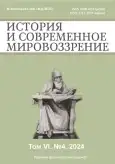Workers and employees of concession companies in Altai: working conditions and characteristics of activity at the turn of the 19th and 20th centuries
- Authors: Demchik E.V.1, Mamzin M.V.1
-
Affiliations:
- Altai State University (AltSU)
- Issue: Vol 6, No 4 (2024)
- Pages: 21-28
- Section: HISTORY OF RUSSIA
- URL: https://journal-vniispk.ru/2658-4654/article/view/281043
- DOI: https://doi.org/10.33693/2658-4654-2024-6-4-21-28
- EDN: https://elibrary.ru/SFEHFY
- ID: 281043
Cite item
Abstract
The efficiency and productivity of an enterprise directly depend not only on the actions of management, but also on the conditions under which the employees work. This article examines the socio-economic and legal status of employees in concession companies in the Altai mining industry during the period of rapid development of capitalism in Russia. Within the scope of this article, we attempt to analyse imperial legislation, the number of employees, types of positions, and their household and financial conditions using examples from the implementation of concession policies in the region. Our research methodology is based on the «microhistory» approach. The text highlights the evolution of regional labor laws, changes that were directly related to the Altai gold mining industry. Information is provided on the number of employees and types of work in mining enterprises. The comparative results of wages at individual concessions in the region and on a national scale are summarized. The main social and domestic challenges faced by employees at concession companies in Altai, such as a lack of access to quality healthcare and unsanitary living conditions, are discussed. Additionally, efforts by concession management to address these issues are presented.
Keywords
Full Text
##article.viewOnOriginalSite##About the authors
Evgeniya V. Demchik
Altai State University (AltSU)
Author for correspondence.
Email: demtchikev@mail.ru
SPIN-code: 4179-6267
Dr. Sci. (Hist.), Professor, Head of the Department, Institute of History and International Relations
Russian Federation, BarnaulMikhail V. Mamzin
Altai State University (AltSU)
Email: mamzin2000@mail.ru
SPIN-code: 7186-6465
postgraduate student, Institute of History and International Relations
Russian Federation, BarnaulReferences
- Volkov V.V. The everyday extreme of Russian workers // Extreme in the daily life of the population of Russia: history and modernity (to the 100th anniversary of the Russian Revolution of 1917). Leningrad State University named after A.S. Pushkin, 2017. pp. 308 –315.
- Goncharov Yu. M. The formation of class-consciousness among the workers of Western Siberia of the late XIX — early XX centuries // Izvestiya AltGU. 2015. No.4 (88). pp. 42–49.
- Dyachenko Yu. S. Comparative analysis of the conditions of the concession agreements of the campaigns of Alexander von Thurn and Taxis and Dr. Jeanne and Lena Goldfields Limited in the first third of the twentieth century // Preservation and study of the cultural heritage of the Altai Territory. 2013. No. 18. pp. 368–380.
- Zinoviev V. P. The labor movement in Siberia in 1895–1917. Statistical analysis // Bulletin of Tomsk State University. History. 2011. No. 3 (15). pp. 13–19.
- Skubnevsky V. A. Zmeinogorsk at the beginning of the XX century. // Silver Crown of Russia. Barnaul, 2003. pp. 223–232.
- Skubnevsky V. A. Workers of the manufacturing industry of Siberia (90s of the XIX century — February 1917). Tomsk: Tomsk University Press, 1991. 270 p.
- Faronov V.N. The struggle of workers for their interests in Western Siberia of the late XIX — early XX century // Izvestiya AltGU. 2015. No.3 (87). pp. 244–250.
- Shkodinsky S.V. The ratio of nominal and real wages in the agricultural labor market of Russia of the late XIX — early XX century according to the results of research by domestic specialists // Bulletin of the Academy of Law and Management. 2015. No.3 (40). pp. 95–103.
- Yudina T.V. Remuneration of workers at concession enterprises of the Russian Empire at the beginning of the twentieth century // Power. 2014. No.10. pp. 189–194.
- Malozemoff P. A. Life in Mining: Siberia to Chairman of Newmont Mining Corporation. The Regional Oral History Office University of California. The Bancroft Library Berkeley, California, 1990. 408 p.
Supplementary files








